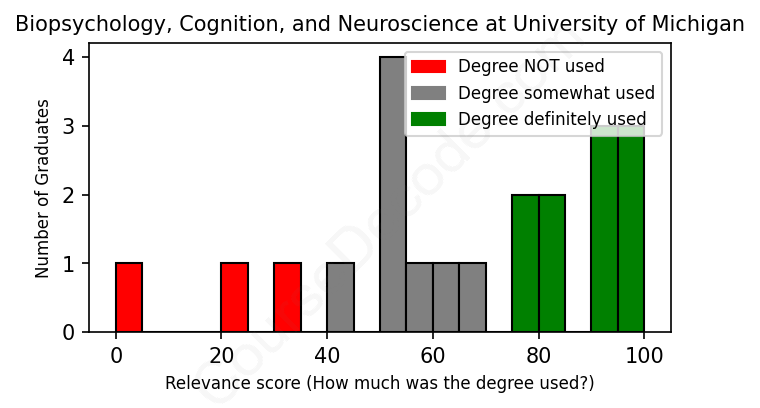
First, some facts. Of the Biopsychology, Cognition, and Neuroscience graduates from University of Michigan we've analyzed , here's how many have used (or NOT used) their degree in their career:

These are estimates based on AI analysis of 21 LinkedIn profiles (see below).
The verdict? Slightly above average. Overall, with an average relevance score of 68%, Biopsychology, Cognition, and Neuroscience graduates from University of Michigan have a slightly higher likelihood (+1%) of finding work in this field compared to the average graduate across all fields:
And for comparison, here's the chart for all profiles we've looked at across all degrees.
Also, after graduating, 83% of these graduates have pursued further education other than another Bachelor's degree (such as a Masters degree or other), compared to the average across all profiles of 35%. This suggests you may need more than just a Bachelors degree to be competitive as a Biopsychology, Cognition, and Neuroscience graduate.
See the details:
|
Relevance score: 81% We think this person has gone into a career highly relevant to their degree. We think this person has gone into a career highly relevant to their degree.
DEGREE INFOGraduated in 2021 from University of Michigan with a Bachelor of Science - BS in Biopsychology, Cognition, and Neuroscience. Also pursued further education since (see below). JOB HISTORY SINCE GRADUATIONResearch Assistant University of Michigan Institute for Social Research Feb 2022 - Jul 2023 Academic and Test Preparation Tutor  Nurturing Wisdom Tutoring Oct 2023 - Present FURTHER DEGREES DONE SINCE GRADUATINGDoctorateThe Chicago School of Professional Psychology 2023 - 2028 ABOUTDedicated, enthusiastic, and conscientious graduate of the University of Michigan with a Bachelors of Science in biopsychology, cognition, and neuroscience. I am passionate about equitable and accessible healthcare, especially pertaining to mental health. I thrive in situations where I can work as a part of team, collaborating with others to arrive at solutions of how to best assist individuals and populations. |
The top 10 most common jobs done by the graduates we've analyzed (ranked most common to least) are:
From the analysis of LinkedIn profiles of graduates with a degree in Biopsychology, Cognition, and Neuroscience from the University of Michigan, it’s clear that there’s a mixed bag when it comes to the relevance of their jobs to their degree. A notable proportion of these individuals have pursued careers as Research Assistants, Clinical Research Associates, or in similar scholarly positions that harness the research methodologies and knowledge associated with their field. These roles are definitely related, as they often involve applying biopsychological principles and cognitive theories in real-world settings, especially in academic or clinical environments.
However, many graduates have also ventured into roles that seem less directly connected to their studies, such as Medical Receptionists, Analysts, and various administrative positions. While some aspects of their educational background may provide helpful insights into human behavior or cognition in these jobs, the core responsibilities tend to focus more on administrative or analytical skills rather than on the specialized knowledge of biopsychology or neuroscience. In summary, while there’s a significant number of graduates finding jobs directly in their field, a considerable number are branching out into roles that, though they might utilize soft skills related to their studies, do not fully leverage the technical knowledge they gained during their education.
Here is a visual representation of the most common words in job titles for Biopsychology, Cognition, and Neuroscience graduates (this is across all Biopsychology, Cognition, and Neuroscience graduates we've analyzed, not just those who went to University of Michigan):

Looking at the career trajectories of graduates in Biopsychology, Cognition, and Neuroscience from the University of Michigan, it's clear that many of them initially enter roles that are closely related to the medical and research fields. For instance, first jobs after graduation often include positions like research assistants or various clinical roles, which are great stepping stones into more advanced careers. Over the first few years, it appears that many graduates progress into roles such as clinical research associates and analysts, indicating a shift towards more specialized research or data analysis positions within the health sector.
However, it's also evident that not every graduate sticks strictly to the neuroscience path. Some have taken more administrative or support roles, such as medical receptionists and administrative assistants, which may not fully utilize their specialized knowledge. By about five to ten years out, many of these alumni have moved on to meaningful positions like senior analysts or business operations leaders, suggesting that while some might diverge from directly using their biopsychology background, they still find ways to integrate their skills into substantial careers. Overall, while there's a mix of career outcomes, many graduates seem to achieve solid roles related to their degrees, though there are certainly others whose paths are less directly aligned with their studies in Biopsychology, Cognition, and Neuroscience.
Honestly, a Bachelor’s degree in Biopsychology, Cognition, and Neuroscience can be pretty challenging, especially at a big research university like the University of Michigan. You’re diving into some seriously complex topics that involve a mix of biology, psychology, and neuroscience, which means a lot of heavy coursework and sometimes tough lab work. It’s not impossible, but you definitely need to be ready to put in the time and effort. Balance is key—if you stay on top of your studies, get to know your professors, and don’t hesitate to ask for help when you need it, you can totally do it! Overall, it's more demanding than some other degrees, but also super rewarding if you're into the brain and behavior.
Most commonly, in the LinkedIn profiles we've looked at, it takes people 4 years to finish a Bachelor degree in Biopsychology, Cognition, and Neuroscience.
So, looking at these grads from the University of Michigan, it seems like most of them are on a pretty decent pay scale, especially compared to typical starting positions right out of college. The earlier jobs, like medical receptionist or food server, aren’t the highest earners, but once they moved into roles like Clinical Research Associate and Analyst, their salaries likely picked up significantly. Many of them have transitioned into positions that typically pay well, especially those in healthcare and research—they might be making solid salaries now. Of course, it's all relative and depends on the field and specific role, but overall, I'd say they seem to be in a good spot financially as they progress in their careers.
Here is a visual representation of the most common words seen in the "about" section of LinkedIn profiles who have a Bachelor degree in Biopsychology, Cognition, and Neuroscience (this is across all Biopsychology, Cognition, and Neuroscience graduates we've analyzed, not just those who went to University of Michigan). This may or may not be useful:

Here are all colleges offering a Bachelor degree in Biopsychology, Cognition, and Neuroscience (ordered by the average relevance score of their Biopsychology, Cognition, and Neuroscience graduates, best to worst) where we have analyzed at least 10 of their graduates:
| College | Score | Count |
|---|---|---|
 University of Michigan University of Michigan
|
68 | 21 |